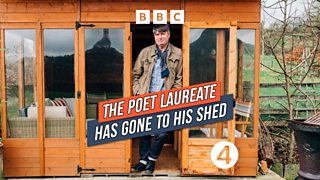Sir Ian McKellen: 10 things we learned when he spoke to the Poet Laureate
To kick off the new series of The Poet Laureate Has Gone to His Shed, Simon Armitage welcomes actor and cultural icon, Sir Ian McKellen.
With a career spanning over seven decades, there’s a lot to talk about and, among other things, they take in Sir Ian’s memories of watching cricket in his hometown of Wigan, getting a tattoo with the Lord of the Rings cast, and why Magneto and Gandalf are handy characters to have played when it comes to dealing with well-wishers.
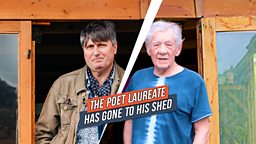
In The Poet Laureate Has Gone To His Shed Simon Armitage opens the doors of his writing shed in the Pennine Hills to talk to Ian McKellen, whose stage and screen acting career, spanning seven decades, includes creating Gandalf and Magneto.
Cricket was his first fascination
Before Sir Ian started going to the theatre, cricket was the first spectacle in his life. His parents’ garden backed on to Wigan Cricket Club, so he has a ringside seat to watch the game for free at weekends. Sir Ian even used to do the scores for the Second XI after attending Sunday School (“They paid me half a crown”, he recalls). During his time in Wigan, up to the age of 12, McKellen saw greats of the sport including Cyril Washbrook, Len Hutton and Jack Aitken. “You'd think I might have wanted to play cricket myself because of all this?” he remarks, “But no, I was very happy just being an audience for cricket. Before I got into acting, I was an audience.”
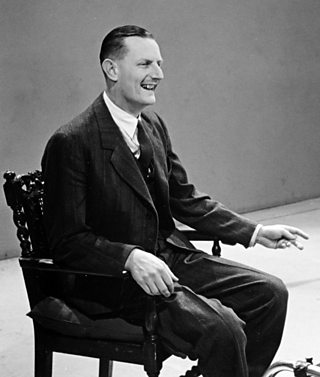
Theatre became a major hobby when he was at school
Initially, Sir Ian was happy to be in audience mode for theatre too. “I liked going to the theatre and listening to plays on the radio on Saturday night, but to be in them wasn’t what I expected at all.”
It wasn’t long before Sir Ian’s “major hobby” of watching theatre two or three nights a week transformed into performing in plays at school. “I remember my dad saying ‘Why didn't you stop rehearsing these dumb plays indoors and go and get some good fresh air on the terraces at Wigan Athletic?’, so I think I let them down a bit.”
His mother's death changed Sir Ian’s life at a young age
Despite his father’s comment, both of Sir Ian’s parents were regular theatregoers, at a time when there was a lively amateur theatre scene in the regions. Sadly, Sir Ian’s mother wasn’t to see her son succeed in his chosen field. Shortly after the family moved to Bolton, she died. Sir Ian was just 12. “Although I pretended it wasn’t, it was pretty devastating. I'm not sure deep down whether I’ve ever quite recovered from it.”
Theatre ultimately bonded Sir Ian with his dad
In 1963, when Sir Ian was 24, he appeared at the opening of the Nottingham Playhouse in Coriolanus, directed by Tyrone Guthrie, who Sir Ian describes as “the greatest Shakespeare director of his time.” Guthrie told Sir Ian’s father, who had made the trip down from Bolton, that “you must be very proud of your son.”
“It was an instruction, an order,” recalls Sir Ian, “I picked that up and Dad picked it up, and I think we were never closer in that moment as when a third party came in and bound us together.”

Art imitated life when tragedy struck Sir Ian鈥檚 life for a second time.
A year later, Sir Ian was in a play called A Scent of Flowers, where the main character’s coffin is on the stage. In the middle of the run, his father died in a car crash and, unable to take time off, Sir Ian travelled from London to Bolton to attend the funeral and journey back again, in time for the evening performance.
Gielgud's [congratulatory] telegram was a communication from one of the gods. But I've got letters from Laurence Olivier telling me how to act, which I didn鈥檛 bring...Sir Ian McKellen
“I found myself on stage with a coffin,” Sir Ian remembers, “and, in that performance, I remember thinking ‘Oh, that's a coffin.’ Previously, I just looked on it as a prop, I didn't believe in it, but I'd just seen another coffin that morning with Dad in it.”
He went from watching John Gielgud to being praised by him
During his early life, Sir Ian fed his fascination for theatre with visits to the RSC in Stratford-upon-Avon where he saw the likes of Laurence Olivier, Vivien Leigh, Charles Laughton, Peggy Ashcroft, Edith Evans and John Gielgud perform.
Years later, in 1969, aged 29, Sir Ian was at the Edinburgh Festival playing Richard II, a role that Gielgud was renowned for playing. After his first night he received a telegram that read: "Greeting Ian McKellen, Assembly Hall, Edinburgh. Thrilled to read your fine notice this morning's Times. All good wishes and congratulations. John Gielgud."
Sir Ian describes the telegram as a “a communication from one of the gods”, one that he is pleased to show Simon, though he adds: “I've got letters from Laurence Olivier telling me how to act, which I didn’t bring.”
He thinks being an actor is a childish thing to do
Asked by Simon if he thinks that acting is a way to stay young, Sir Ian says: “I see very little distinction between the joy I get out of acting now and the joy I used to get out of it when I was 12. And what was that joy? Partly showing off, partly the praise you got from those who otherwise ignored you. But most of all, just a sense of achievement.”
He describes acting as “a childish activity” and something that “children are very good at, better sometimes than sophisticated grown-ups who have forgotten how to act.” However, while there is lots of play involved in acting, Sir Ian says: “I don't think that means that you're childish in the rest of your life.”
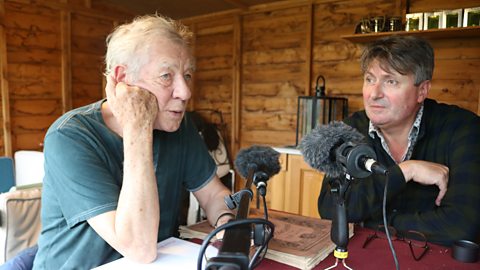
Famous for a classic: "The Lord of the Rings is my Casablanca."
Sir Ian McKellen tells Simon Armitage how blockbuster movies suddenly boosted his fame.
Sir Ian made numerous films without becoming “internationally famous”, so when the Lord of the Rings trilogy came along, his reaction was “What was going to be different about this trio?”
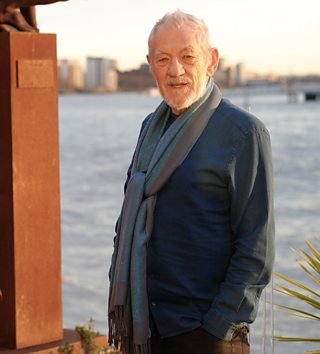
As he says himself, these were films that “an awful lot of people wanted to see” and ones that people “still enjoy 20 years on.”
“I’m famous for a classic, it’s my Casablanca, which is absolutely lovely.”
He thinks Gandalf and Magneto are handy characters for crowd control
Putting the X-Men films in the same category of Lord of the Rings, Sir Ian says he is grateful for those who thank him for “the enjoyment that I'd hoped to give them.”
“For someone who is basically shy, to be able to go into a room of strangers anywhere in the world knowing there will be somebody there who wants to say hello to me is very nice.”
Sir Ian adds that his interactions with fans have a “a certain restraint” and politeness about them because “you don’t mess around with either Magneto or Gandalf.”
He had a tattoo done for Lord of the Rings
Along with fellow Lord of the Rings cast members, Sir Ian has a tattoo of the elvish word for ‘nine’ on his upper right arm, because there were nine members of the fellowship of the ring.
Explaining how cast camaraderie manifested itself in an inking, Sir Ian said: “The hobbits were all of an age, and the elves said they were going to have it done, so we were invited to pollute our bodies. The dwarf refused, so his stand in was stamped in his place. But I thought it was rather racy to go down. It didn't hurt. It itched. So, my goodness, I've got a tattoo and a memory of a very, very happy two years.”
He thinks baddies are good
While Sir Ian thinks that working with good directors and actors is more important than the part itself, he admits that playing terrible people is interesting.
“You know that they're horrible people and do terrible things, like Macbeth, Iago, but you have to find out what it's like to be that character. When you're playing Richard III, you discover that you're not half as bad as people think you are because you've got good reason for what you're doing. 'My mother, she’s hated me all my life because I'm deformed. She wanted a perfect baby. Now I hate the world.' That's an interesting to play that. You may do monstrous things. But you don't feel like a monster.”
He thinks actors are public servants
More than just seeing acting as a vocation, Sir Ian regards the profession as a public service. This sentiment comes from the post-war government’s support of regional theatre (through the Arts Council) to liven up what was, according to Sir Ian, an otherwise “dreary” time in British history.
“When I started acting, I always felt I was a civil servant, a public servant. I didn't expect to be paid a lot of money because it was too enjoyable a job, and when I arrived in Nottingham or Ipswich or Coventry or Liverpool, I felt that I was arriving to contribute to the life of the city. I was happy to stay there for months, becoming part of it.
That's a sort of act of activism, isn't it, a sort of politics in action?”
Listen to The Poet Laureate Has Gone to His Shed with Sir Ian McKellen.

Further listening on 麻豆官网首页入口 Radio
-
![]()
Desert Island Discs: Sir Ian McKellen
Sue Lawley's castaway is actor Sir Ian McKellen.
-
![]()
The Poet Laureate has Gone to His Shed
Poet Laureate Simon Armitage talks to guests about life, language and music in his shed.
-
![]()
Poetry Please
Roger McGough introduces selections of poetry on various themes, chosen by listeners.
-
![]()
Poetry Extra
Daljit Nagra's slot on Radio 4 Extra gives listeners a weekly opportunity to revisit the riches of the 麻豆官网首页入口 radio poetry archive

